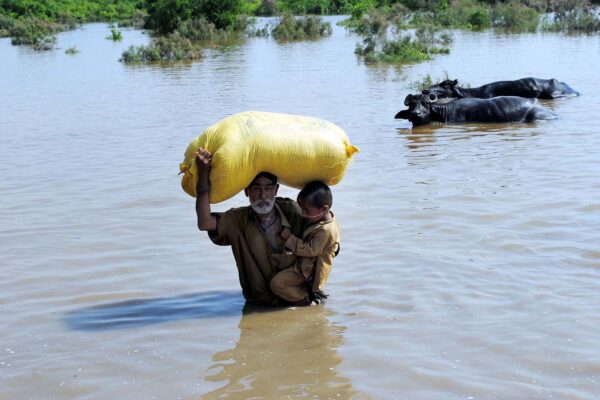The journey of discovering my identity as a third generation British-Pakistani was certainly an interesting one. Going through phases of certainty, then confusion, back to certainty and then… yep, you guessed it, confused again.
Growing up as a child I just assumed I was British. I was most proficient in English, my home language was largely English (unless I was being told off, then all of a sudden my mum would switch to Punjabi) and I was born in England. However, as I grew older into my teen years and was faced with the question, “Where are you from?” my answer always used to be “British.” Then the all too familiar question would follow, “No, I mean where are you REALLY from?”
I realised the colour of my skin somehow disqualifies me from being British. Stranger still, I would never identify as English, but British. Which to me meant one thing, my nationality was British, but my identity was not.
Then came my patriotic Pakistani phase, where I would only identify as Pakistani. Funnily enough during this phase, the same people who would ask, “No where are you REALLY from?” somehow got offended that I now identified as Pakistani. When they protest “but you’re British!!” I would respond with “The piece of paper they call my citizenship is British, but the blood that runs through my veins is Pakistani.” A little dramatic, I know, but it did the job. Then I would proceed to ask them,
“If my remains were found in rubble, and a DNA test was conducted on my corpse, would they identify a British male or a Pakistani male?”
This usually gave them something to think about. However, even this became more complicated when I was granted dual nationality. That all changed when I actually went to Pakistan for the first time in about 15 years.
I remember this incident clear as day.
I was in Islamabad, and went to ask a man behind a street stall a question, here I was, all hyped up and ready to use my Urdu skills, but before I opened my mouth he started speaking English to me. I was perplexed, and he told me he knew I was from Britain. I was shocked to say the least, after speaking to more locals in Pakistan they told me how they can tell whether a Pakistani is born and bred in Pakistan and whether they’re foreigners.
Well, being rejected by actual Pakistani’s was quite something. Back to square one. It was only then that I realised that “British Pakistani” is an actual identity, after all we have a lot of British culture, the mannerisms, we understand the humour, our language and of course who doesn’t like fish and chips on a Friday, and a cheeky beans on toast (non-British people find this insane).
It was then after some hard thinking I realised that British Pakistani’s are in an identity crisis. But that nothing sums us up better than the term British Pakistani. We truly are part British and part Pakistani. I know for one whenever I go abroad, after some time I start to miss Britain, my home, and my area. I always relish in the feeling of arriving back into Heathrow after a holiday, that is until I’m pulled away by security and asked a load of questions about the stamps on my passport, where I went and why I went.
There are ways which British-Pakistani’s relate to each other more than any other group. We have common experiences growing up, that are exclusive to British Pakistani’s, similar senses of humour, we fulfil certain stereotypes that we protest aren’t true but we all know they are somewhat true. I believe the same to be true of other diaspora groups. Nonetheless, here’s a list of some of the common types of confused British Pakistani’s you’ll find:
The Blackistani
Engrossed in the hip-hop culture, essentially identifies with black culture even though he doesn’t relate with all the issues in black culture, because, well primarily, he’s not black. Comfortable using the N word, though having no real idea of what that word means.
The Arabistani
This is your classic just turned “religious” Pakistani. He has completely disowned culture because “religion and culture aren’t compatible,” (whilst unaware that he has simply substituted his own culture for Arab culture). He has learnt to pronounce the letter “ayn” approximately 3 days ago, and uses it wherever he can, however he can, even if incorrect. He says “ya’ni” in the middle of a sentence, just because he can.
The Gorastani – (Gora, meaning white)
This is your classic British Pakistani who would rather forget the Pakistani part and seek as much proximity to whiteness as possible. She probably uses Fair & Lovely cream, and tells other people of colour, including other Pakistani’s to “go back to your country.” This one has a problem with immigration levels being too high even though… yeah, his family came into the country as immigrants. Happy to sell out his own people for his own advancement.
The wannabe freshy – (a freshy being someone born and bred in Pakistan)
This is someone who is still in the, “I’m only Pakistani, what is British mate” phase. He’ll go out of his way to be a freshy. He will speak Urdu unnecessarily and act confused when you don’t understand. He’ll wear a salwar kameez absolutely everywhere, even to a high end restaurant. There is no changing this man. You do something even slightly British, and the man will become enraged about how we’re “losing our culture.” The culture that this person speaks of is actually usually all the bad elements of the culture, never the intricate mannerisms that exist in the Pakistani culture.



